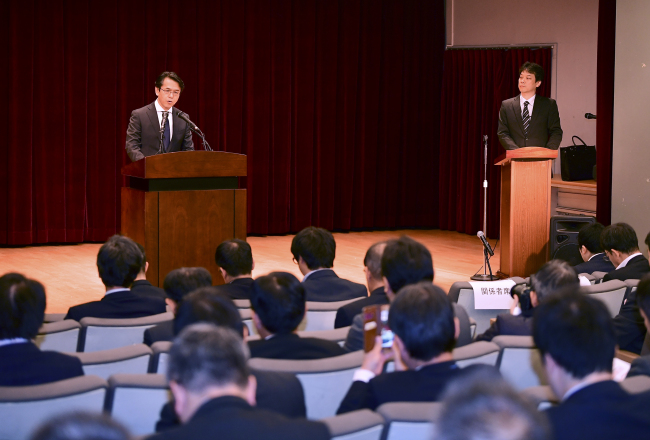Japan's embassy meets businesses over WWII forced labor ruling
By Ock Hyun-juPublished : Nov. 15, 2018 - 14:20
The Japanese Embassy in Seoul on Thursday held a presentation for Japanese businesses operating here over a ruling in favor of South Koreans forced into labor during Japan’s colonial rule of the Korean Peninsula amid an intensifying diplomatic row between the neighbors.

Kohei Maruyama, a minister at the Japanese Embassy in Seoul, stressed that Tokyo’s priority is to protect Japanese firms’ legitimate economic activities here, which analysts see as a thinly veiled threat that Japanese businesses could withdraw from the South Korean market.
The Supreme Court recently ruled that Japan’s Nippon Steel & Sumitomo Metal Corp. must compensate four South Koreans, who were forced to work at its steel mills during Japan’s occupation of the peninsula, a decision Japan denounced as “unthinkable.”
“As we have said on multiple occasions, the Japanese government’s stance stands firm that (the issue) had been solved under the 1965 South Korea-Japan Normalization Treaty completely and finally,” Maruyama said.
“We will take countermeasures based on the stance.”
Tokyo has said that the ruling on forced labor is in violation of the 1965 treaty and overturns the legal basis of South Korea-Japan relations, calling on Seoul to take “appropriate action.”
“We are watching the South Korean government’s specific action to be taken,” he said.
Under the treaty that settled colonial-era issues, South Korea restored diplomatic relations with Tokyo in return for a reparations package of $500 million in grants and low-interest loans that contributed to Seoul’s economic takeoff.
Some 100 people from 70 Japanese companies are said to have attended the presentation.
South Korea is trying to find a way “respect” the judiciary’s decision without further straining ties with Japan. It announced a plan to create a body comprising government officials and outside experts under Prime Minister Lee Nak-yon’s office to draw up follow-up measures.
In a sign of Japan’s ramped-up pressure on South Korea, Tokyo decided to unilaterally take the case to the International Court of Justice without South Korea’s consent. It requested the steel firm not to compensate the victims, and ordered overseas Japanese embassies to spread its claim that the ruling is in violation of international law, according to Japanese news reports.
“The Japanese government must be clearly aware that excessive political emphasis on the present case will be of no help to the future-oriented relationship between South Korea and Japan,” the South’s Foreign Ministry said.
By Ock Hyun-ju (laeticia.ock@heraldcorp.com)
-
Articles by Ock Hyun-ju






![[From the Scene] Monks, Buddhists hail return of remains of Buddhas](http://res.heraldm.com/phpwas/restmb_idxmake.php?idx=644&simg=/content/image/2024/04/19/20240419050617_0.jpg&u=20240419175937)









![[From the Scene] Monks, Buddhists hail return of remains of Buddhas](http://res.heraldm.com/phpwas/restmb_idxmake.php?idx=652&simg=/content/image/2024/04/19/20240419050617_0.jpg&u=20240419175937)

![[KH Explains] Hyundai's full hybrid edge to pay off amid slow transition to pure EVs](http://res.heraldm.com/phpwas/restmb_idxmake.php?idx=652&simg=/content/image/2024/04/18/20240418050645_0.jpg&u=20240419100350)

![[Today’s K-pop] Illit drops debut single remix](http://res.heraldm.com/phpwas/restmb_idxmake.php?idx=642&simg=/content/image/2024/04/19/20240419050612_0.jpg&u=)